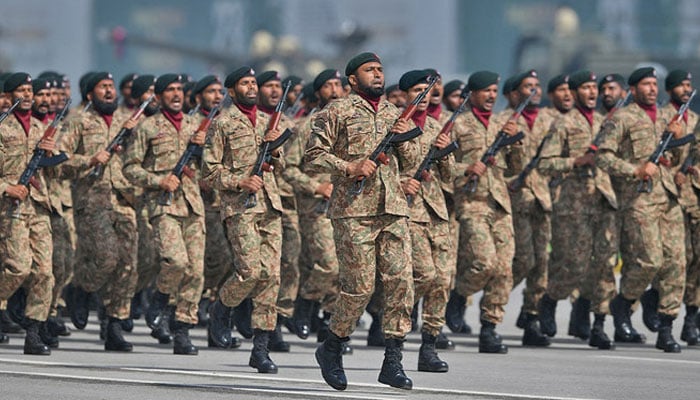The glue of Pakistan
Consensus among global experts is clear: Pakistan Army is not merely military institution but backbone of nation’s integrity
Pakistan is facing a multi-pronged assault from destabilizing forces. Centrifugal pressures are relentlessly working to divide the nation, much like hostile adversaries attacking a fortress. Six renowned experts offer their insights:
Dr George Friedman, a leading American strategist and founder of Stratfor, asserts that as long as the Pakistan “army remained united and loyal to the concept of Pakistan, the centrifugal forces could not tear the country apart.” In his opinion, the Pakistan Army is the linchpin of national cohesion; as long as the military remains united and committed to Pakistan, the centrifugal forces will be unable to dismantle the state.
Professor Stephen Cohen, a renowned American political scientist and South Asia expert argues in his book 'The Pakistan Army' that the Pakistan Army is not just a military force but also a key pillar of the Pakistani state. He suggests that the army is the guardian of Pakistan's ideology and territorial integrity. Professor Cohen believes that the army's strong central role is vital to preventing the disintegration of the country, especially given Pakistan's diverse ethnic and regional tensions.
Dr Anatol Lieven, British author, journalist, and policy analyst asserts in his book 'Pakistan: A Hard Country' that the Pakistan Army is the strongest institution in the country, acting as a unifying force in a nation plagued by ethnic, sectarian, and regional divisions. Lieven argues that the army’s cohesion and discipline are key factors in holding the country together, especially in the face of challenges that could otherwise lead to fragmentation. Lieven's unique ability to blend historical context with incisive analysis underscores his expertise on the subject.
Dr Carol Christine Fair, an American political scientist specializing in South Asian politics and military affairs, has provided in-depth analyses of Pakistan's military in her book 'Fighting to the End: The Pakistan Army's Way of War'. Dr Fair posits that the Pakistan Army's institutional identity is deeply intertwined with the preservation of the state. She argues that the army’s doctrine is centered around defending the country against both external threats and internal challenges. Dr Fair believes that the military's central role in politics and governance is seen as essential by the army leadership to maintain national unity and prevent state collapse.
Shuja Nawaz, a Pakistani-American author, journalist, and former director of the South Asia Center at the Atlantic Council, in his book 'Crossed Swords: Pakistan, Its Army, and the Wars Within', highlights the army's role as the primary institution that has historically managed to hold Pakistan together. Shuja Nawaz argues that the military's involvement in politics and governance, though often criticized, has been seen by many within the country as a necessary measure to prevent political instability and potential fragmentation. Shuja Nawaz is recognized for his deep insights into the Pakistan Army.
Dr Hassan Abbas is distinguished professor of international relations at the Near East South Asia Strategic Studies Centre (NESA), National Defense University in Washington DC. In his book, 'Pakistan's Drift into Extremism: Allah, the Army, and America's War on Terror', Dr Abbas argues that the Pakistan Army has historically played a crucial role in holding the country together, especially during periods of political instability and rising extremism. Dr Abbas also emphasizes that the army's involvement in politics is often justified by the need to prevent internal divisions and external threats from undermining Pakistan's sovereignty.
The consensus among leading global experts is clear: the Pakistan Army is not merely a military institution but the backbone of the nation’s integrity. And, as long as the military remains united and committed to Pakistan’s survival, the forces of disintegration will remain at bay. Weakening this critical pillar of the state would not just undermine security but would imperil the very existence of Pakistan itself.
The writer is a columnist based in Islamabad. He tweets/posts @saleemfarrukh and can be reached at: farrukh15@hotmail.com
-
 Belgium Watchdog Launches Antitrust Probe Into Google Ads Business
Belgium Watchdog Launches Antitrust Probe Into Google Ads Business -
 Andrew Ready To Fight Back: 'He's Very Vengeful'
Andrew Ready To Fight Back: 'He's Very Vengeful' -
 After Surpassing 100 Million YouTube Subscribers, BLACKPINK Returns With New Release
After Surpassing 100 Million YouTube Subscribers, BLACKPINK Returns With New Release -
 Rihanna Sends Fans Into Frenzy With BTS Footage Of Music Making: Watch
Rihanna Sends Fans Into Frenzy With BTS Footage Of Music Making: Watch -
 More Americans Say They Sympathise With Palestinians Than Israelis, Poll Finds
More Americans Say They Sympathise With Palestinians Than Israelis, Poll Finds -
 Princess Finally Releases Meghan Markle, Prince Harry's Photos
Princess Finally Releases Meghan Markle, Prince Harry's Photos -
 Victoria Beckham Makes Exciting Announcement Amid Ongoing Rift With Brooklyn Beckham
Victoria Beckham Makes Exciting Announcement Amid Ongoing Rift With Brooklyn Beckham -
 King Charles Receives Major Blow After Meghan Markle, Harry's Trip
King Charles Receives Major Blow After Meghan Markle, Harry's Trip -
 Kate Middleton Apologizes After Her Umbrella Bumps Child's Head
Kate Middleton Apologizes After Her Umbrella Bumps Child's Head -
 Retired US Fighter Pilot Arrested Over Alleged Training Of Chinese Military
Retired US Fighter Pilot Arrested Over Alleged Training Of Chinese Military -
 Why Sarah Ferguson's Next Move Matters?
Why Sarah Ferguson's Next Move Matters? -
 Kris Jenner's Plan For Kylie Jenner To 'seal The Deal' With Timothee Chalamet Unveiled
Kris Jenner's Plan For Kylie Jenner To 'seal The Deal' With Timothee Chalamet Unveiled -
 Kim Kardashian Changes Approach To Dating Amid Lewis Hamilton Romance
Kim Kardashian Changes Approach To Dating Amid Lewis Hamilton Romance -
 Andy Cohen Gets Emotional As He Addresses Mary Cosby's Devastating Personal Loss
Andy Cohen Gets Emotional As He Addresses Mary Cosby's Devastating Personal Loss -
 Andrew Feeling 'betrayed' By King Charles, Delivers Stark Warning
Andrew Feeling 'betrayed' By King Charles, Delivers Stark Warning -
 Andrew Mountbatten's Accuser Comes Up As Hillary Clinton Asked About Daughter's Wedding
Andrew Mountbatten's Accuser Comes Up As Hillary Clinton Asked About Daughter's Wedding




